War Declared in Europe
World War II is declared in Europe with the German invasion of Poland. Britain and France declare war on Germany two days later.
World War II is declared in Europe with the German invasion of Poland. Britain and France declare war on Germany two days later.
The IAFF begins its 21st year with a new cover design for the International Fire Fighter.
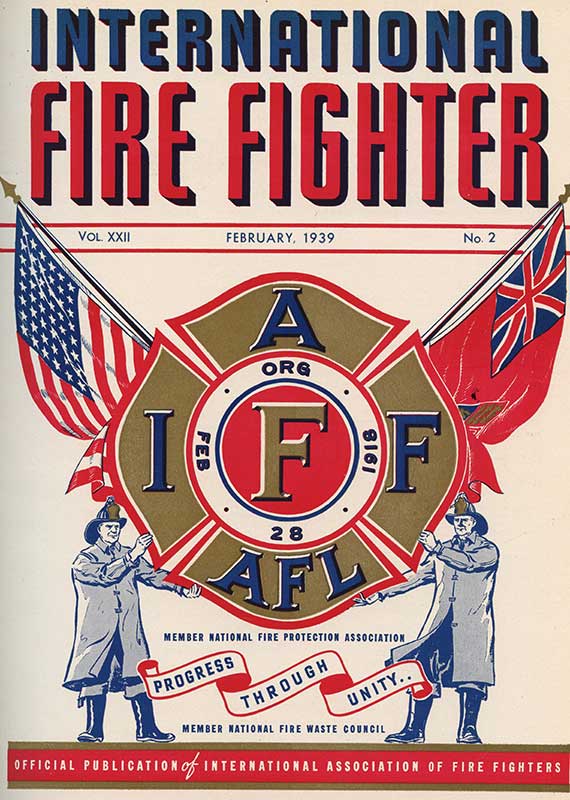
The IAFF celebrates the spread of civil service laws, significant shortening of hours of work and growth in salaries for fire fighters.
The IAFF advises members that it won’t be necessary to file income tax returns for the year 1938 given the number of bills introduced in Congress dealing with this matter.
The IAFF reports that fire fighters’ average salaries increased 61.5 percent between 1918 ($1,295) and 1939 ($2,100). Using the 100 largest cities as a basis for comparison, the average fire fighter salary increased $800 per year, or 61.5 percent — a very definite answer to the question as to whether membership in the IAFF is a worthwhile investment.
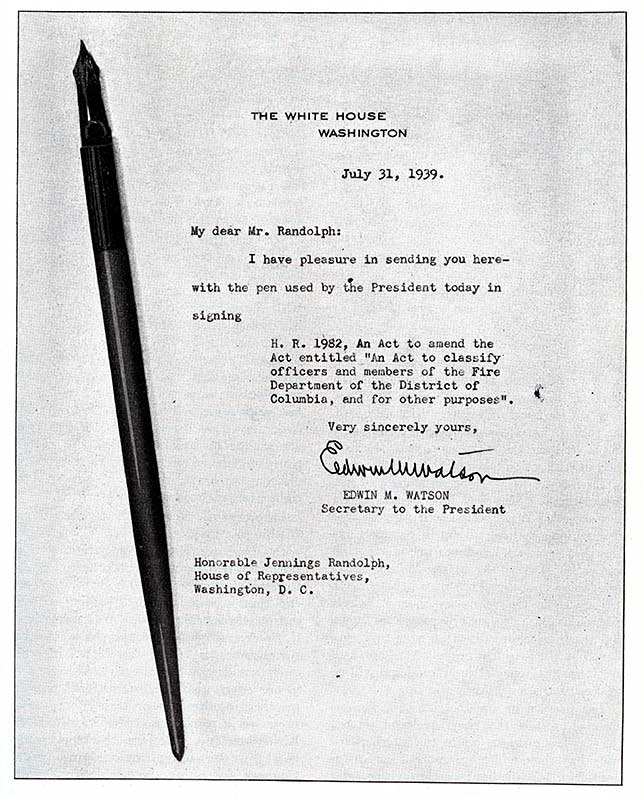
Congress introduces and passes HR 1982, removing the barrier to DC Fire Department members from affiliating with the IAFF. Congress passes a bill allowing DC fire fighters to work a 60-hour week.
It is especially encouraging to the International Association of Fire Fighters to note that most of the cities in the country have restored salaries of fire fighters to their pre-depression or 1920 levels.
Fred Baer, IAFF President (1919-1946)
IAFF members willingly serve their nations, and almost half of those employed in the fire service are eligible for the draft. Fire chiefs face a serious problem replacing their experienced fire fighters who had joined the Armed Forces. Concerned about weakened fire protection, the IAFF encourages fire fighters to rotate shifts and work paid overtime during wartime. As fire fighters return from the war, the IAFF works to make sure members can return to their firehouses and that disabled fire fighters can find positions in the fire service.
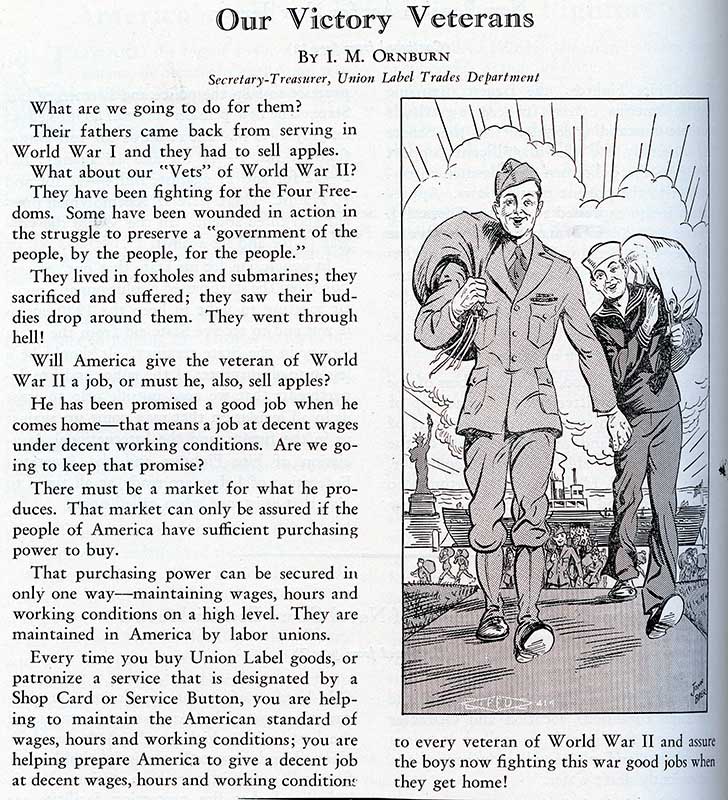
The IAFF engaged its first medical advisor – Max H. Skolnick, MD of Detroit – to carry out research in the physical effects of firefighting with special attention to heart disease.
The IAFF develops a series of 10 circulars, which are sent to practically every unorganized fire department in the United States. The circulars are also published on the back cover of the International Fire Fighter.

Nineteen state and provincial associations are affiliated with the IAFF.
The 1940s saw major advances in membership and effectiveness, even as the IAFF coped with wartime and post-war problems. Although a World War II wage freeze largely stymied efforts to counter wartime inflation, the 48-hour work week became widespread.
In a letter to IAFF Secretary-Treasurer George Richardson, the Director of the Federal Bureau of Investigation (FBI) John Edgar Hoover – on orders from President Franklin D. Roosevelt – asks the IAFF to turn over any information obtained related to espionage, counter-espionage, sabotage, subversive activities and violations of neutrality laws.
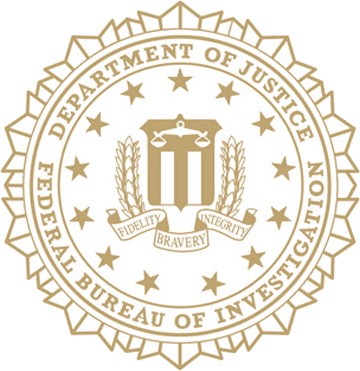
The Immigration and Naturalization Service sends a letter to IAFF Secretary-Treasurer George Richardson requesting the IAFF’s cooperation in publicizing the compulsory registration of aliens in the U.S. in accordance with the Alien Registration Act of 1940.
Delegates at the IAFF 15th Convention, held in Des Moines, Iowa, approve a resolution to establish a Fire Defense Committee. IAFF President Fred Baer writes to President Franklin D. Roosevelt asking him to set up a committee from the fire service for determining how the fire service could best be of assistance in the national defense program. A Committee is appointed to explore the entire field of firefighting and fire prevention.

President Franklin D. Roosevelt publicly opposes anti-labor employers and reactionary congressmen clamoring for restrictive anti-labor laws.
The Public Safety Tax Act is signed into law, requiring local and state employees in the United States to pay federal income tax, including fire fighters. Compensation received after December 31, 1938, was deemed to be taxable.
President Franklin D. Roosevelt vetoes a bill providing for a 60-hour work week for DC fire fighters on the grounds that the financial condition of the city cannot support it. The IAFF continues efforts to help DC fire fighters obtain a shorter week. Meanwhile, he signs a bill allowing members of the DC Fire Department who have served 25 years and who are 55 to retire.
Dr. Max H. Skolnick begins to compile a registry of occupational and, therefore, compensable diseases and illnesses among firemen.
Columbus, Ohio, is the first fire department in the United States to have all its members trained in first aid. Fire fighters are required to have at least 30 hours in first aid work, serve as instructors of first aid and take water life-saving courses.
An IAFF resolution to create a state and provincial legislative fund is narrowly defeated in a roll call vote, with 88 voting yes and 91 voting no.
President Roosevelt, in his Labor Day address, broadcast on the second anniversary of the start of the war in Europe, pledges that, “We shall do everything in our power to crush Hitler and his Nazi forces.” He added that “no group of Americans has realized more clearly what Nazi domination of the world means than has organized labor – what it means to their standard of living, their freedom, their lives.”

The importance of fire defense is established with the release on April 1 of “Fire Bulletin No. 1” by the U.S. Office of Emergency Management.
The IAFF announces the launch of the British Fire Fighters’ Relief Fund Drive to raise money to help fire fighters and their families injured from enemy action. Contributions from IAFF members total $154,000.

Twenty-two state and provincial associations are now affiliated with the IAFF.
The IAFF decries Congress’ decision to refuse to provide protection for civil defense workers and urges fire fighters to arrange for their own coverage.
IAFF Secretary-Treasurer George Richardson is appointed a member of the Labor Advisory Committee of the Office of Civilian Defense, representing the American Federation of Labor.
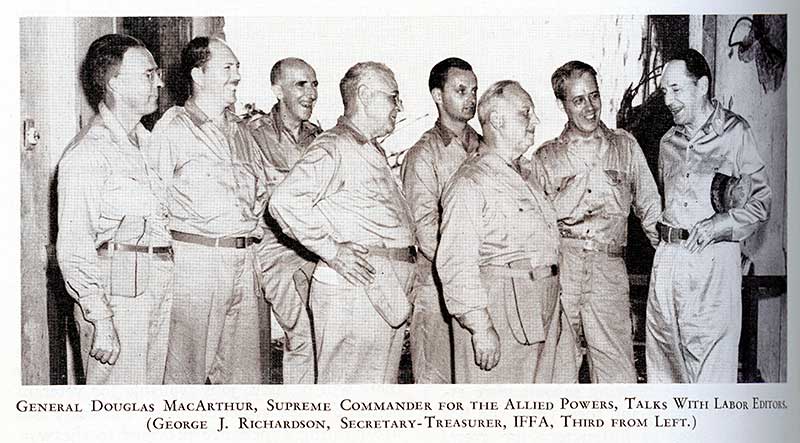
The Healey Bill, H.R. 4882, as now written, protects all those covered by pension systems and permits the extension of the Social Security Act to those employees not having any pension protection.
Provisions of the Selective Service Act state that whenever any fire fighter is called before the local draft board, he may ask that he be placed in a deferred class because of his occupation.
The IAFF holds its 16th Convention in Columbus, Ohio, the first wartime Convention.

The IAFF asks secretaries of locals to provide new contact information for members who are serving in the Armed Forces so they may continue to receive their copies of the International Fire Fighter. The IAFF also recommends that secretaries keep records of time contributed by fire fighters to the nation’s war efforts. Many enlightening and inspiring letters commending this request from locals are received by IAFF headquarters staff.
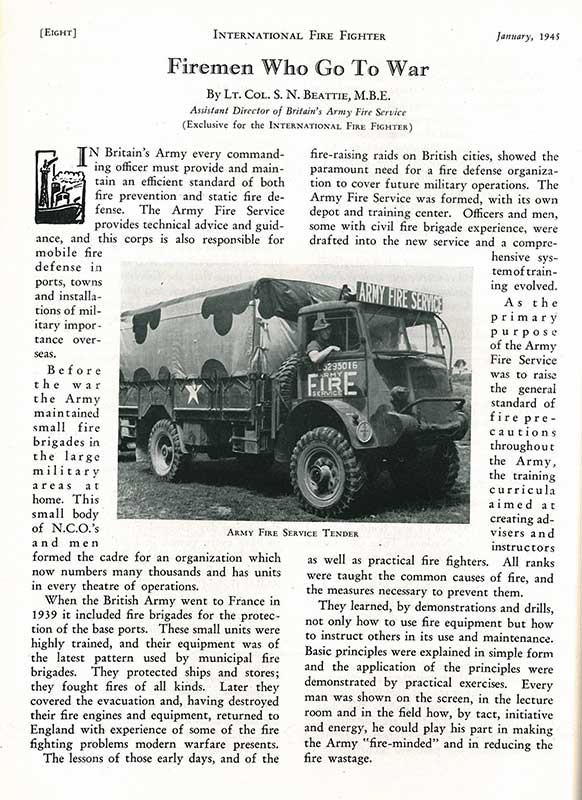

400 people are killed in a fire at the Cocoanut Grove, a restaurant/supper club. Rescue operations begin immediately, but the full horror of what awaited the fire fighters inside the building was not fully realized for a period of time. The IAFF praises Boston Local 718 fire fighters for their heroic efforts in battling the Cocoanut Grove night club fire.

In a chemical research breakthrough, flammable fabrics in the home now may be “flame-proofed.” Known technically as ammonium sulfamate, the new fire retardant has multiple industrial uses as well, such as in airplane manufacture, in shipyards and for workmen’s clothing in steel mills.
The average fire fighter earns 50 cents an hour and works 70 hours a week.
The IRS sends a letter to the IAFF indicating that pensions are regarded as compensation for services previously rendered and are, therefore, subject to income tax under the Revenue Act of 1942. A second letter from the IRS exempts from income tax any annuity payments made to former employees as part of their contributory retirement plans since these are not “wages.”
The IAFF publishes an article on strategies for fighting airplane crash fires.
To meet the financial requirements of the war, union members are required to pay a new 5 cent Victory Tax on all wages in excess of $12 per week, which is to be deducted from payrolls and forwarded to the U.S. Treasury Department by all employers.
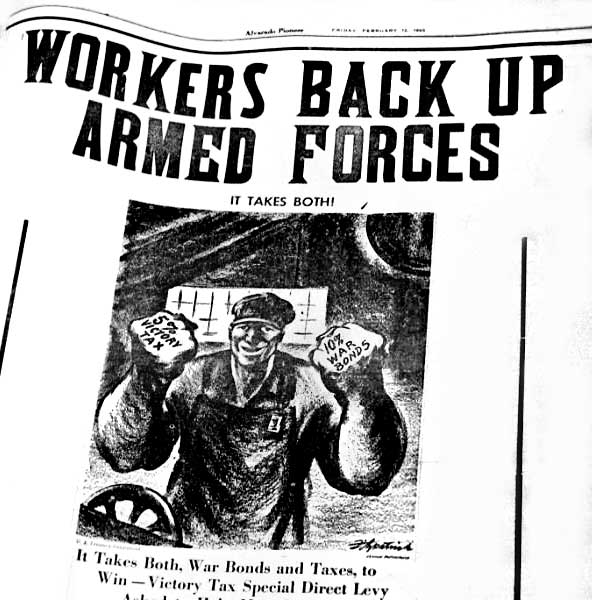
The U.S. Office of Civilian Defense asks the Federal Communications Commission to amend the rules of the War Emergency Radio Service so that the emergency radio system can be made available for use by the fire service.
In cooperation with the government and to comply with regulations regarding the use of paper, one rather than two copies of the International Fire Fighter is sent to fire departments nationwide.
The IRS rules that the cost of meals prepared at fire stations is not deductible from income tax returns.
The IAFF proclaims that it is members’ duty to support the American Red Cross’ efforts to raise $2 million to aid in war relief.
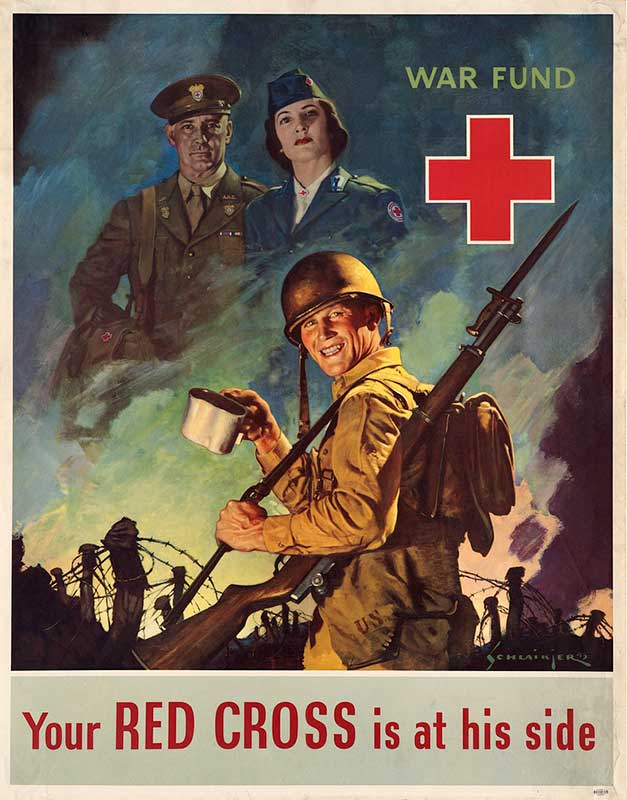
The IAFF publishes a summary of the fire dangers of ammunition, explosives and hazardous chemicals which move over rails and highways of the United States, often through population centers.

The Federal Communications Commission reports that municipal fire departments across the United States will have access to emergency radio services, one medium frequency and two very high frequencies, which are presently allocated for the use of marine fire stations.
The Servicemen’s Readjustment Act of 1944, also known as the G.I. Bill, becomes law. It provides a range of benefits to provide immediate rewards to returning World War II veterans (commonly referred to as G.I.s). It was designed by the American Legion, which helped (along with the Veterans of Foreign Wars) push it through Congress.
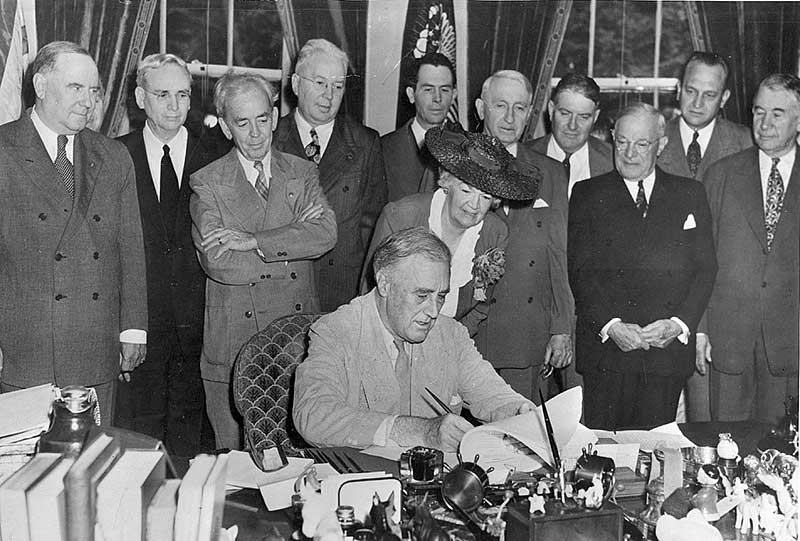
IAFF membership climbs to 60,000, thus fast reaching its goal of organizing all fire fighters.
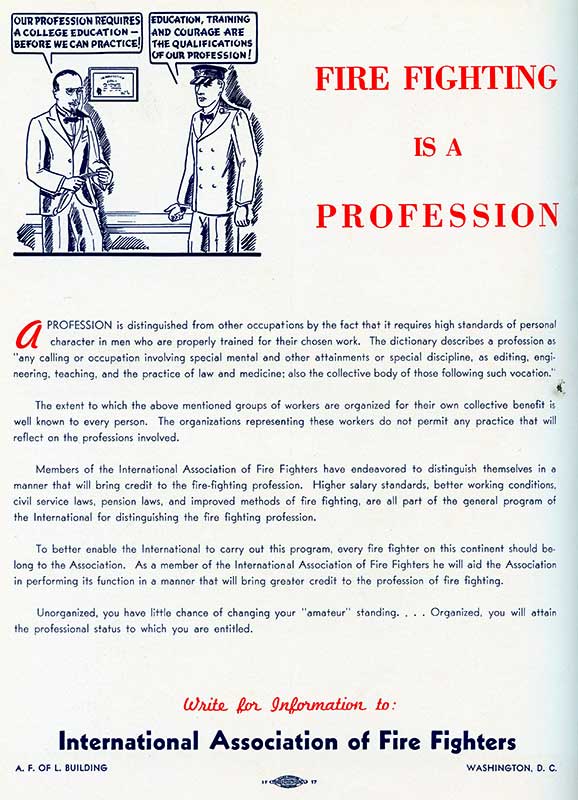
Delegates gather in Louisville, Kentucky, for the IAFF 17th Convention.
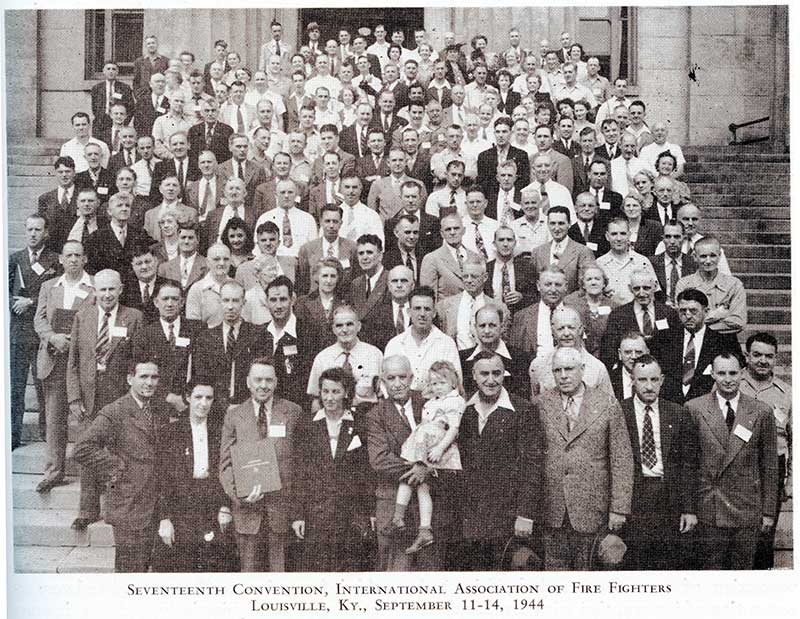
The IAFF publishes a list of working conditions in 730 fire departments in the United States and Canada. Many locals report improvements, including shorter work weeks, one day’s rest in seven, sick leave with pay and city-provided uniforms and firefighting gear.
The IAFF addresses emerging benefits and fire hazards in the new age of plastics, as well as the effect of meteorological conditions and terrain on the development and spread of fire.
Some state laws impose a tax on the premiums of fire insurance companies to be allocated back to respective communities to help fund relief and pension funds for the fire service. The U.S. Supreme Court rules that insurance is interstate commerce and subject to federal laws and interstate commerce regulations, putting these existing state laws and regulations in jeopardy.
The IAFF encourages members to participate in the Seventh War Loan Drive to help the war effort.
Due to the draft, voluntary enlistment and retirements, there are 15 percent fewer men in the fire service than during the previous five-year period.
All locals in Canada are urged to take action to have the Canadian government grant to the members of the Canadian Overseas Fire Fighting Corps gratuities similar to those granted to the members of the Armed Forces and the Merchant Marine.
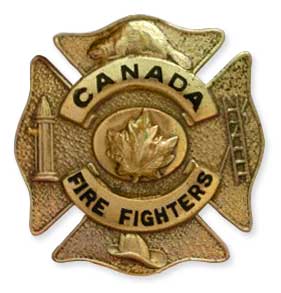
The IAFF continues to make great gains in organizing fire departments. In the past year, it has issued charters to 42 municipal fire departments, 11 federal fire departments and two state groups.
IAFF President Fred W. Baer dies unexpectedly after 27 years of dedicated service to the union. John P. Redmond, Chicago Vice President, is elected acting president of the IAFF by the Executive Board.
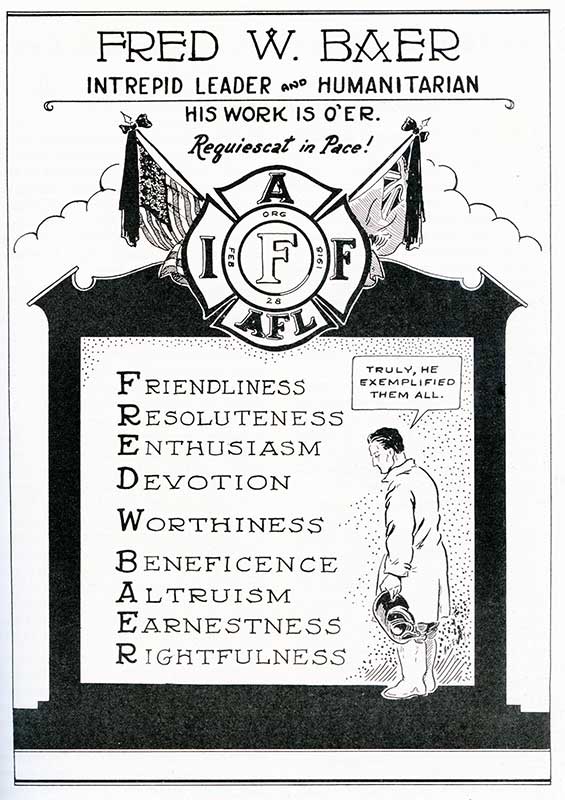
The IAFF holds its 18th Convention in Toledo, Ohio.
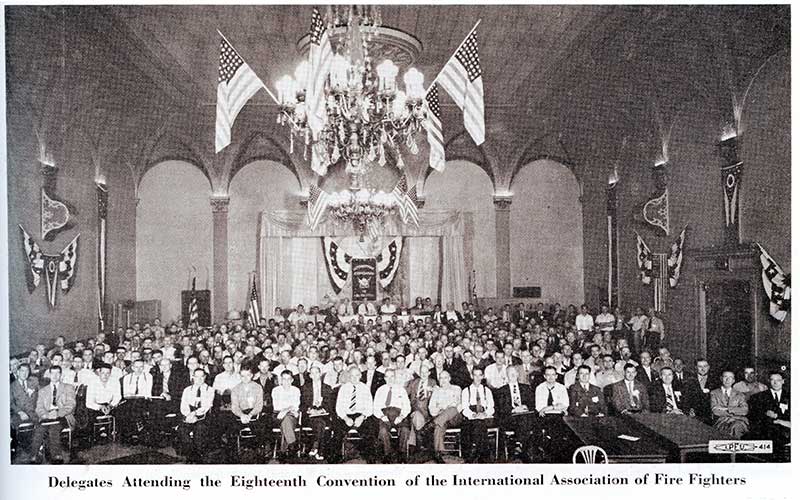

Recognizing the dangers posed by atomic bombs, the IAFF supports the State Department’s proposal that all uranium deposits be placed under international control.
President John P. Redmond designates the 18th Convention meeting a “Victory Convention.”

The International Fire Fighter wears a “new uniform” with redesign and special features on humor and science in recognition of the appointment of a new acting president.

The IAFF publishes an article from National Underwriters predicting that due to the high prices of commodities and employment stagnation after the war, arson crimes will proliferate nationwide. This crime wave is anticipated despite the enactment of the model arson law in 39 states.
The IAFF argues against placing insurance companies under a Federal Act instead of a state regulatory act, as this would prove disastrous to the interests of the members. This position is set forth, despite the fact that 200 insurance companies, known as the Southeastern Underwriters’ Association, are indicted for engaging in certain practices which constrain interstate trade and commerce by fixing and maintaining arbitrary and non-competitive rates on fire and other types of insurance.
IAFF President John P. Redmond describes for members the legislative procedures necessary to pass a law successfully.
To secure any type of legislation requires not only forethought, but much hard work by the coordinated groups. The first consideration to be given to any piece of legislation is to see that the bill will do what it is intended to do.
John P. Redmond, IAFF President (1946-1957)
Congress enacts the “slave labor bill” – also known as the Taft-Hartley Act – over the president’s veto, thereby restricting the activities and power of labor unions.
The IAFF publishes an article on the need for great skill and judgement in fighting aircraft fires, a relatively new field for most municipal fire departments.
More than 2,000 representatives of states, municipalities, federal government, and business, professional, civic and service organizations gather in Washington, DC, in May to attend the President’s Conference on Fire Prevention.
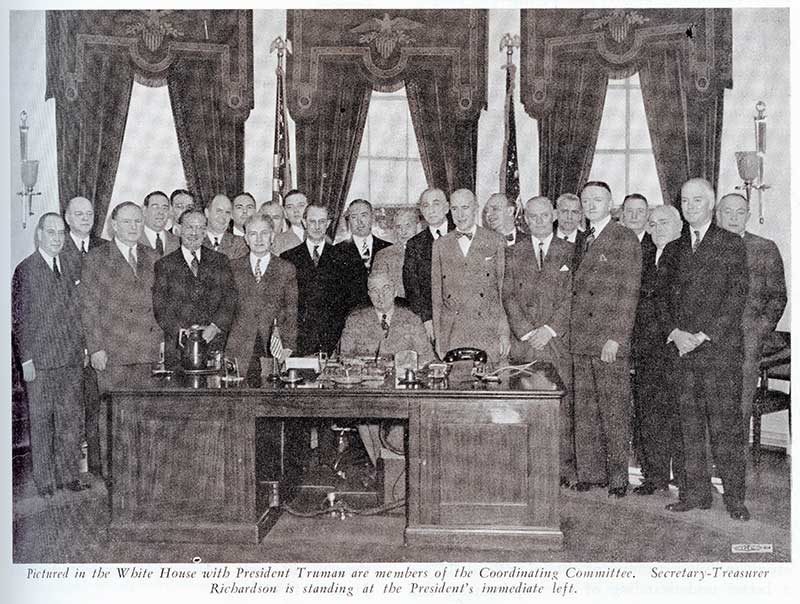
In the past 12 months, the IAFF gains 56 new locals, grants five new federal charters and forms one state association.
The IAFF grows to 950 locals and 65,000 members who reside in practically every large city in the United States and Canada.
New lapel emblems, heavily gold plated with side enamels of red, white and blue, in memory of the late President Fred W. Baer, are made available through IAFF headquarters for $1.00.
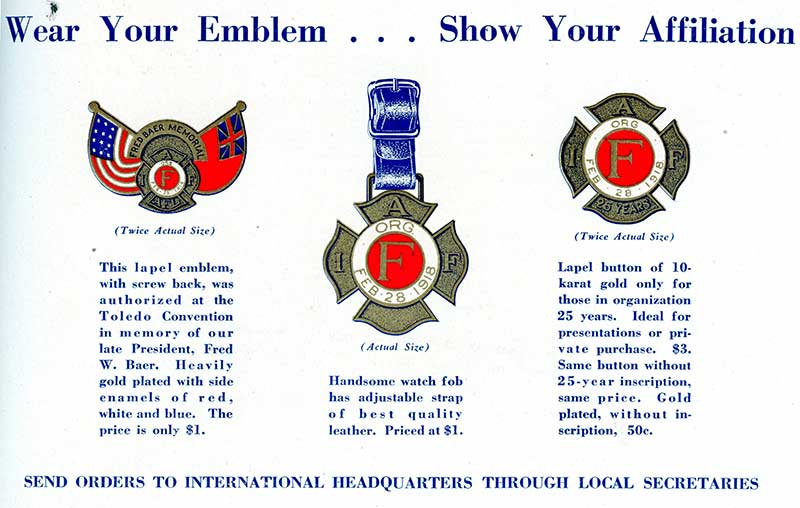
Fire truck famine sweeps the nation. Manufacturers bemoan the backlog of orders for $40 million in new firefighting equipment. At least one of every five fire trucks is deemed over-age or obsolete.
Four Minneapolis fire fighters die when trapped in the flaming interior of the Hull-Dobbs motor firm and garage as they were trying to lay hose inside the entry to the burning building. Without warning, the marble floor gave way, plunging three of them into the smoke-filled building to their death. A fourth fire fighter, who was injured in the blaze, died three weeks later.
The Ontario, Canada, legislature passes model bill to protect fire fighters and their working hours.
The U.S. Justice Department fines two corporations and six individuals for conspiracy to monopolize the fire alarm industry.
The IAFF publicizes a Journal of the American Medical Association review of the “Fire Fighters’ Occupational Diseases” book by Max H. Skolnick, MD and IAFF Secretary-Treasurer George Richardson. The book chapters focus on heart disease, tuberculosis and pneumonia, among other occupational diseases.
A Corps of Canadian Fire Fighters is honored for gallantry in the Battle of Britain. More than 400 men, handpicked from 107 municipalities, served as part of the Department of National War Services. Thirty-five percent of the members are professional firemen who help to train others.
A U.S. Veterans Administration survey discloses that more than 3,000 World War II veterans are training under the G.I. Bill to become fire fighters.
The 19th IAFF Convention is held in Houston, Texas.
Antigo, WI is the IAFF’s 1,000th local, chartered on September 27, 1948.